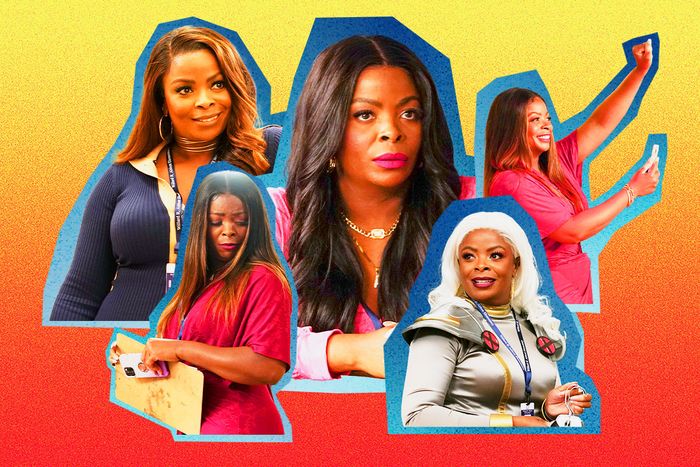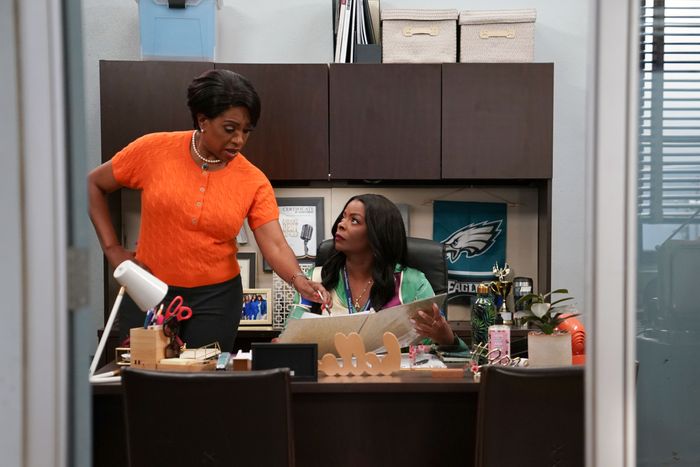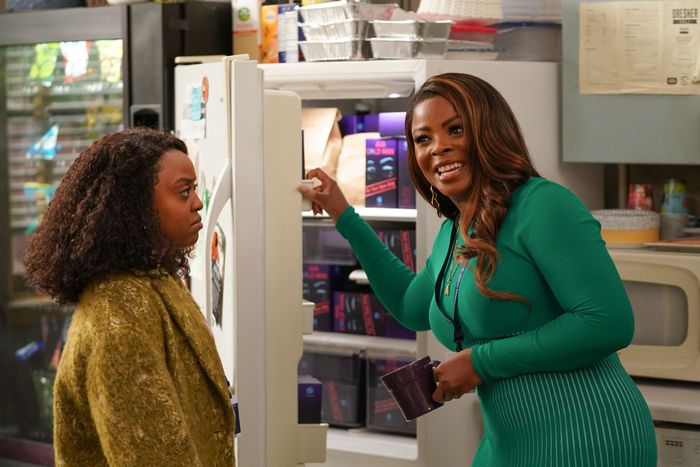
The character: Ava Coleman, principal at Abbott Elementary, thorn in second-grade teacher Janine Teagues’s side, sexual harasser of first-grade teacher Gregory Eddie, devoted Philadelphia Eagles fan, perpetual side hustler and scammer.
The actor: Janelle James, stand-up comedian, writer, and actor on series such as Black Monday and Central Park. Since breaking out on Abbott, James has appeared on Netflix’s The Standups and made guest appearances on Life & Beth and Tuca & Bertie.
Essential traits: Outlandish, self-aggrandizing, dismissive of others’ concerns and contributions, sarcastic. Vain in matters of appearance and humor. A multipotentialite cinephile, doomsday prepper, clotheshorse, and step dancer. Intermittently, and often secretly, sensitive.
“This precocious child trying to do the job of a principal”
In 2020, when Quinta Brunson began to write about an ensemble of teachers who care deeply for their students at an underfunded Philadelphia public school, Principal Ava Coleman had already taken shape in her mind. “I wanted this person who was entertaining and a joy to be around, although ultimately kind of useless,” Brunson explains. “This woman used the school for her own vanity and made it her playground.”
After ABC committed to a pilot in February 2021, Randall Einhorn, The Office director and cinematographer who helped shape the mockumentary sitcom subgenre Abbott Elementary would soon join, signed on as an EP. He immediately recognized Ava as crucial comic relief. “The story has a message that’s good for people,” he says. “You need to hide the peas and the potatoes sometimes.” Ava has no background in education — she got her job by blackmailing the superintendent over his infidelity; Einhorn describes her as “this precocious child trying to do the job of a principal” — but she’s an integral part of Abbott’s ensemble because her inadequacies “activate” the other characters to react to her flaws, he explains. “If you put Ava in the middle, she’s this thing everybody has to contend with,” he says. “You have this healthy wheel trying to do its best, but the axle is broken. It’s not going to turn well, so everybody needs to do what they can to get down the road.”
Casting began via Zoom. As soon as Janelle James appeared, Brunson thought, We’re done. It is her. James’s energy clicked from her audition, but Brunson sensed she could bring a depth to Ava that would make her more than just an antagonist. Plus, James knew how to have fun with the script. “She just picked it up and ran with it,” remembers Einhorn. The confidence James cultivated from her stand-up career was key to the character — “That’s something a lot of people don’t have, so it stands out to them. Some people will love it, some will absolutely hate it,” she says — and she augmented it with tangible signifiers: fast talking, excellent posture, and a “debutante physicality” that includes tossing her hair, looking over her shoulder, and folding her hands in front of her body. James also sprinkled in indications of Ava’s addictive personality, including the “eight gallons of sugar” she dumps into her coffee in the teachers lounge.
But most important, says Einhorn, James knew how to play to the camera, an aspect of Ava’s character producers amped up over time to align with this skill. While the teachers primarily use the cameras for in-scene side-eye or talking-head interviews, Ava is constantly engaging with the documentary crew to crack jokes, disparage her co-workers, and comment on students. On set, Einhorn says, that can mean James tries four different ways of walking through a doorway to find the most amusing line delivery. “Janelle didn’t know how good she was,” he adds. “She knows she’s funny; she just didn’t know she could act.” In fact, when James floated the idea of taking an acting class to Brunson, the showrunner discouraged her. “She said, ‘Why would you do that?’” James remembers with a laugh. “‘Don’t lose what makes you special.’”
“You end up with these very weird lines”
The pilot establishes Ava’s core characteristics, including her rivalry with Janine, who sets this subplot in motion by emailing the superintendent to complain about Ava’s negligence. When veteran teacher Barbara, played by Sheryl Lee Ralph, explains that she gets by at Abbott by “knowing there’s not much you can do, Ava,” the principal takes the jab as an acknowledgment of her hard work. ”She’s the ringleader of the circus,” says James, and that involves maneuvering teachers, students, and staff to best serve her whims: making teachers sign nondisclosure agreements, organizing student files by “sexiest dads,” going rogue on a field trip to the zoo by taking the kids to exhibits she wants to see. Complementing these antics are references to Ava’s wide array of interests, most of which are incorporated into episodic subplots: Her apocalypse planning in season one lands her on the cover of Doomsday Preppers magazine in season two; the green screen installed in her office aids in her influencer aspirations; and her rivalry with her sorority sisters inspires her to approve an accelerated curriculum so she can “be like Charles Xavier with legs, with hundreds of smart kids that I didn’t give birth to, obviously.”
Over the course of the first season, the writers kept adding Ava obsessions, says story editor and writer Joya McCrory, because they knew James could handle it. “What is the most outlandish thing she can say that also has a little base of reality to what’s going on at Abbott? Then you think about Janelle’s voice, and you end up with these very weird lines,” McCrory explains, remembering a table read where James cracked up the room with her pronunciation of the word pigeon. “There’s no limit to the jokes we can give her.” But Brunson will nix ideas — such as Ava dry-docking Jet Skis in Abbott’s parking lot — “to pull us off the edge of ridiculousness,” McCrory adds.
“Scripts come to us filled with jokes,” says James, and the actors can make changes to best suit the scene. Einhorn praises her for taking it a step further by coming to set with ”fully formulated takes that are full of Ava attitude.” Some of the first season’s funniest lines stem from James’s improv, including the beloved “Let me back my tasty ass up!” The actor’s personal favorite comes from the pilot, when Ava — who has just spent thousands of dollars of school emergency funding on a sign featuring herself — mimics the pose she’s making on the sign while showing it to the teachers.
But James insists Abbott Elementary is a collaboration. She won’t improvise until asked, nor does she commit to memory every spontaneous moment she thinks up. “After the show comes out, I don’t remember, Oh, it was written like this, and then I added this, because I’m not looking for points. That’s thirsty,” James says. “My goal is to do the best performance with what was given to me, and if I get a couple of zingers in there, that’s all gravy.”
James’s sense of restraint is key to “Step Class,” a season-one episode in which Ava and Janine butt heads over their approaches to coaching the after-school program. “We all came in thinking, Janine vs. Ava, and Quinta quickly put a stop to that,” McCrory remembers. They discarded pitches like competing step classes and Ava locking Janine out of the gym, opting for the pair to collaborate in order to recognize each other’s strengths. The episode also provides a glimpse into Ava’s tender relationship with her aging grandmother, whose nurse drives her to the school to see Ava’s face after she has a spell of fear and confusion. (“When we were watching it being filmed, people were getting emotional,” McCrory remembers.) The episode marks a turning point for the character, adding nuanced interiority “without being too melodramatic,” McCrory adds.
“The newest and brightest”
Although Abbott is noticeably struggling — faulty lighting; not enough supplies; lack of funding for technology, arts education, and field trips — Ava’s own spaces and attire communicate her expensive taste and egomania. To signal her flexibility with the budget (as long as it benefits herself ), the principal’s office harbors the “newest and brightest,” according to production designer Cherie Day Ledwith: an executive-style wooden desk and hutch, a glass-front sideboard, upholstered chairs, and a personal coffee machine and minibar (“It’s an elementary school. Like, who are you drinking with?” James says, laughing). The omnipresent candy speaks to the character’s immaturity, and the headgear hanging on the wall represents the many hats Ava wears as principal and scammer. The photos in her office are, of course, primarily of herself, including a collage, created using James’s own social-media selfies, the set decorators unveiled as a surprise for the actor. Ava’s selfie with Gritty, taken when the Philadelphia Flyers mascot cameoed in the season-two premiere, is a newer addition, while a vase of orchids hints at the “softer side” of Ava, as seen in the episodes “Step Class” and “Sick Day,” Ledwith explains.


For season two, Ledwith built two more Ava-centric locations: a permanent closet attached to the principal’s office that houses the “vintage 2019 Zara” outfits and other items Ava sells online during school hours, and a glitzy bathroom hidden in the school’s basement, filled with luxe touches like Art Deco–style light fixtures, gold wallpaper, and an elaborate tile floor. (The production team initially toyed with putting the bathroom on the school’s roof but ultimately decided to build off the basement’s already-constructed set.) The maximalism in these rooms echoes the drama of Ava’s work wardrobe — animal prints, leather pencil skirts, stilettos — which is more suited for a night of clubbing than a day behind a desk. “It’s all inappropriate for school,” James says.
“Be good, then regret it”
After “Step Class” revealed Ava’s compassionate side, the first season ends with the principal stepping up for Abbott and its teachers during an appeal for discretionary funding from the school board. This competence is short-lived, however. With an expanded season two (22 episodes instead of last season’s 13), the writers’ room could devote more time to the ensemble characters, says script coordinator Riley Dufurrena. That led to another Ava-focused episode, “Sick Day,” written by Dufurrena, in which the principal’s irresponsibility “comes back to bite her,” he explains.
The episode begins with Ava once again using Abbott as a place to conduct other business. She monopolizes all the school’s copy paper to print out full-color fliers for her new scheme, “Ava Cold*Man’s Pop Out Pop Up,” an online shop for cooling eye masks she ships from the closet attached to her office. When Ava takes over the break-room fridge to store her product, Janine gets food poisoning from her unrefrigerated tuna melt and calls out sick for the first time ever. Ava was so busy with her mask sales that she missed a memo notifying her of a substitute-teacher shortage, so the principal herself must sub for Janine and follow the “little nerd binder” the teacher prepared.
James careens through all the character’s strengths and weaknesses in the episode. Her charisma makes Ava’s meanness, as always, delightful, as when she delivers a terse “Shut up, Janine” while reading aloud from the binder’s instructions. The episode succeeds in affirming that Janine, with her go-getter, fix-it-yourself spirit, is more valued by her older co-workers than they’re willing to admit, and pairs Ava and Gregory in a meaningful way when he encourages her to step up for the students. As in “Step Class,” Ava connects with the children she normally ignores and finds the experience rewarding — as long as it remains brief. James’s physicality drops from rigid to relaxed while she reads Eloise for story time, a signal of Ava’s growing comfort in Janine’s classroom, and she contrasts the smile that spreads across her face after successfully helping a child spell a word by insisting to the camera that she’s “helping out a little. Don’t read too much into it.” As Dufurrena puts it: “She enjoys seeing progress from these kids, but she would never admit that.”
Just don’t expect Ava to find her passion for education. “We are always very conscious of how we modulate her redeemability,” says Einhorn. “Her growths are so small because I want to preserve that character. I don’t want to see her grow too much. I want her to be good, then regret it.”
For James, that’s what makes Ava so radical. “To see a Black woman play this type — the goofy, layabout boss, a role usually reserved for white men — it’s like, we can quiet-quit as well,” she says. “It’s hard to play someone that could very easily be hated. I know some people hate me, but I feel like they always come around. In their hearts, they love me.”




